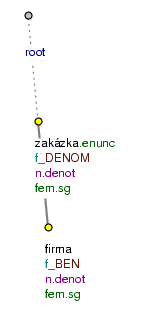We assign the functor BEN to modifications of several meanings:
-
modifications with the meaning of benefit/disadvantage (in a narrower sense).
The modification with the
BENfunctor expresses, to whose benefit, disadvantage, honor or shame the event is happening. It concerns the so called dative of benefit with a possible alternative expression by a prepositional phrase pro+4. Also the emphatic reflexive si traditionally belongs to this group.Examples:
Mikeš chytil krejčímu Matochovi.
BENuprchlého kanárka. (=Mikeš caught an escaped canary for the tailor Matonoha.)Kreslil pro děti.
BENnádherné obrázky. (=He painted beautiful paintings for the children.)zakázka pro firmu.
BEN(=an order for a company) Fig. 7.50Hraje dětem/pro děti.
BENdivadlo. (=He plays theatre to/for children.)Premiér v rozhovoru pro rozhlas.
BENznovu zopakoval, že nemá mandát k rozhodnutí o úplném stažení. (=The prime minister repeated in the interiew for the radio that he has no mandate for the full evacuation.)Žijeme na úkor budoucnosti.
BEN(=We live at the expense of the future.)Statečně si.
BENvykračoval. (=He really stalked for himself.) -
modifications with the meaning of the owner of an object.
The modification with the functor
BENis also used for the owner of an object, especially of a bodily part, pieces of clothes but also other objects. It concerns the so called possessive dative.Examples:
Padá mu.
BENhlava na prsa. (=His head is falling on his breast.)Podjely mu.
BENnohy. (=His feet slipped.)Držel si.
BENklobouk. (=He held his hat.)Teče mu.
BENdo bot. (=It leaks into his shoes.)Hodinky mi.
BENjdou přesně. (=The watch works precisely.) -
modifications with purely comunicative functions (ethical dative).
A modification with the functor
BENcan also express the effort to attract interest and attention of the listener. It usually concerns the forms mi, nám, ti, vám.Examples:
To ti.
BENbyla zábava. (=It was such fun!)Děti se nám.
BENtoulají. (=The children don't come home as they should)Ten pán vám.
BENměl ale fousy! (=The beard the man had!)!!! The functor
ETHDoriginally proposed for the cases of ethical dative is not used any more. The reason is that there are too many unclear cases).
Subfunctors. The BEN functor is further specified by subfunctors. For more on this see Section 13.1.2, "Subfunctors with the BEN functor".
BEN modifications modify verbs (e.g.: Hraje dětem.BEN divadlo. (=He plays theatre for the children.)), nouns (e.g.: přídavky na děti.BEN (=allowance for children)), and adjectives (závěry pro republiku.BEN nepřijatelné (=results unacceptable for the republic)).
Valency. BEN modifications are typically optional. They can only be considered obligatory when competing with manner modifications after certain verbs (verbs that require a modification of manner). For more on this see Section 2.3.1.5.3, "Competing locative/directional adjuncts (of different types)"..
Forms. The basic forms of BEN modifications are:
-
case in a non-prepositional case form.
The most common forms:
dativ Peníze zůstanou klientovi dále na účtě. (=The money stays at the client's account.) -
prepositional phrase.
The most common forms:
k prospěchu+2 Bylo by to ku prospěchu věci. (=That was to the benefit of the matter.) na+4 přídavky na děti (=allowance for the children); Rozhodnutí není přenosné, každý výrobce musí mít rozhodnutí vystavené na sebe. (=The decision is not transferable, each producer has to get a decision issued for him.) na vrub+2 Na vrub daňové reformy lze přičíst osm procent. (=Eight percent can be counted on account of the tax reform.) na úkor+2 Hlavní překážkou státu fungovat na úkor jednotlivce je demokratický politický systém. (=The main obstacle for the state to live at the expense of individuals is the democratic political system.) na účet+2 Nizozemský parlament přijal v souvislosti s rostoucím počtem nelegálních přistěhovalců zpřísněný zákon, a to i na účet domorodců. (=The Dutch parliament accepted a stricter law in connection with the growing number of illegal immigrants, even at the expense of the natives.) pro+4 šance pro movité nájemníky (=a chance for rich tenants) proti+3 Odmítl znevýhodnit české vývozce proti exportérům ze třetích zemí úpravou kurzu české koruny vůči ECU. (=He refused to disadvantage the Czech exporters against the third countries exporters by changing the Czech crown rate to ECU.) v neprospěch+2 Stále je velký nepoměr mezi počtem žadatelů a počtem dětí uvolněných do osvojení v neprospěch manželských párů. (=There is still a great disproportion between the number of applicants and the number of children released for adoption to the disadvantage of the married couples.) ve prospěch+2 Očekává se rozsudek ve prospěch Škodovky. (=A decision in favour of the Škoda factory is expected) v zájmu+2 Věřme, že výši příjmů je třeba v zájmu diváka zachovat. (=We believe that the revenue needs to be maintained in the interest of the viewer.)
Dependent clause. A modification with the functor BEN is represented by a dependent clause only with the help of a supporting word; e.g.:
To je další argument proti tomu, aby mzdová regulace vůbec existovala.BEN (=That is another argument against the sheer existence of wages regulation.)
NB! We insert a node representing a modification with the BEN functor into some control constructions. For more on this see Section 2.4, "Control".
Border with the functor ADDR. The modification with the functor BEN is semantically (as well as formally) close to the Addressee. For more on this border see Section 2.3.1.3.2, "The borderline between the Addressee and Beneficiary".
Border with the functor AIM. The modification with the functor BEN is semantically (as well as formally) quite close to modifications with the functor AIM (see Section 5.1, "AIM"). For more on this see Section 5.1.1, "Borderline cases with the AIM functor ".
Border with the functor REG. The BEN modification can in some cases be also similar to a modification with the meaning of regard (REG; see Section 6.8, "REG"). It concerns the cases of the so called regard dative. There are no clear criteria for distinguishing these cases but in principle we can say: if the modification has a form of the dative and is animate, the BEN functor is to be preferred. Compare:
-
Václav Karas se jim.
BENstával autoritou. (=Václav Kras was becoming an authority for them.)
For more borderline cases with the functor REG see Section 6.8.1, "Borderline cases with the REG functor".
